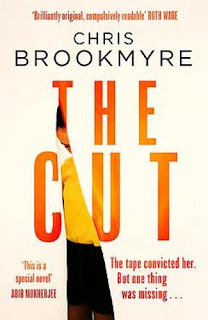The Cut - Chris Brookmyre
Brookmyre opens The Cut with two amusingly confrontational characters and a conventional prologue that promises some murder intrigue involving both. While they clearly have issues and backgrounds that explain their behaviour, neither Millicent nor Jerry seems to be involved in anything that is going to turn deadly, but things are definitely approaching a dead end or point of no return in their lives. Millicent has social problems that give her no end of trouble when having to communicate with the general public. Living with two older ladies, Millicent is definitely a bit of a handful, leaving people little room for interpreting what she thinks of them. There is, we will soon discover, good reasons why Millicent is the way she is, not least of which is a murder conviction in her past.
As for Jerry, well he also has social problems or maybe sociability problems, coming from a troubled background of petty crime, theft and burglary. He’s a bright lad though and is trying to pull his life together doing film studies at university, but feels a bit of a fraud and is made to feel out of place amongst all the well-off students. There’s almost something self-destructive in his actions as if he wants to be found out and told to get back where he belongs. Jerry needs to get out of the toxic environment of the halls of residence and an opening appears that seems too good to be true; sharing a house with three older ladies, one of whom happens to be Millicent.
There’s another interesting connection and element to The Cut that presents another variation on the title. Before the unfortunate incident in her past that has left Millicent unable to function in a social environment, she used to be a make-up artist in the movie business, working in make-up and special effects for gory giallo murder thrillers. One film she was involved with, her last film before her career and life were destroyed, was Mancipium, a horror film that was supposed to redefine the genre. Now, it has the status of a cursed film, all prints destroyed, or at least believed to have been destroyed. What film student and horror aficionado Jerry wouldn’t do to get his hands on a copy of that film. And suddenly he finds that the Millie Sparks who worked SFX on the film is the batty old lady in the house where he now lives.
Although it’s a conventional cheat, promising a dramatic death in the prologue, The Cut doesn’t need that gambit, as you find yourself drawn to the characters, sympathising with the issues they have and curious to see how they come together. Even if you’re not a horror movie giallo fan, the glimpse into the murky world of film financing and promotion is also intriguing. The connection with movies is employed in other ways, with references thrown in not just for show but as a useful tool for getting out of cinematic situations. There are lots of film-buff quotes, nothing too obscure, all fairly mainstream-friendly, which is where you would place The Cut as it evolves into part mismatched buddy movie and part road movie.
There are however rather too many convenient dramatic developments that connect Jerry and Millicent. Although it’s enjoyable to read if you can put up with such contrivances, there’s the feeling that The Cut is Brookmyre on auto-pilot. It helps when this author has a social issue that he wants to get on his high horse about, and there is perhaps a little bit of the old fire still here. The ‘video nasty’ hysteria of the 80s and whether they influence behaviour may be old news, even though it still crops up now in relation to video gaming, but perhaps more relevant, Brookmyre reserves his ire this time for the media barons and their influence over government. It’s still relatively mild stuff for this author, but The Cut is no less enjoyable for that.




Comments
Post a Comment